NL2k regular Freenachos has been running a blog for several years called “One Day I Will See the Light.” In one of his last posts, he explained why he decided to temporarily give up trying to gain a foothold in high stakes.
– In the summer of 2021, I made a fateful decision and quit my job as a teacher for poker. Since then, my life has changed dramatically. My wife and I had two daughters, and that alone would have been enough to turn everything upside down. In addition, my training project NachosPoker has grown to 62 people, I was transferred from the category of ordinary RIO (Essential) trainers to elite (Elite). But despite the many new responsibilities, poker remains my main activity. I'm stuck at $5/$10 and $10/$20 and play both limits with profit. It's incredibly difficult to keep up with everything, sometimes I miss the carefree times of my youth. It is not surprising that many players who find themselves in a similar situation stop playing and go full-time into coaching.
Lately, I have often been thinking about what direction I should take next. I made several unsuccessful shots at $25/$50 and $50/$100, which had a detrimental effect on my profit for this year. Breaking through to the highest stakes is an incredibly difficult task. As Demondoink noted on his blog, this is often a psychological problem rather than a technical one. To be honest, I am no longer sure that at this stage of my life, I am ready for such a challenge.
A short analysis of the sky-high limits on GGPoker. The main problem at these tables is the inconsistent action. For example, over the past 12 months, the top 10 NL1k players played an average of 431k hands. For comparison, the top 10 players by distance at NL10k played only 28.5k hands each. These figures do not reflect the real state of affairs, since almost all players mix rooms and limits; many are quite capable of playing several hundred thousand hands a year. But it's one thing to make a bad shot at NL1k and come back to NL500, and quite another to lick your wounds at NL1k after a bad push at NL5k-10k. It's likely that you won't be able to run 4-6 tables at all when you're ready for your next shot.
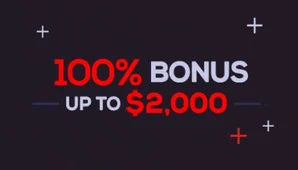
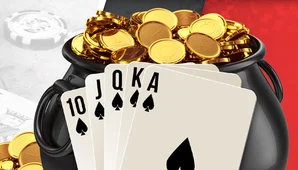

Another factor that must be taken into account is that the game GG is designed in such a way when you move to a higher limit, your $/100 indicator will drop. This is because, at each subsequent limit, your BB/100 win rate (after rakeback) steadily decreases. In other rooms, this indicator remains stable at the same level at different limits. In simple terms, you can win more at NL10k than at NL1k, but the difference will not be ten times, but, say, six.
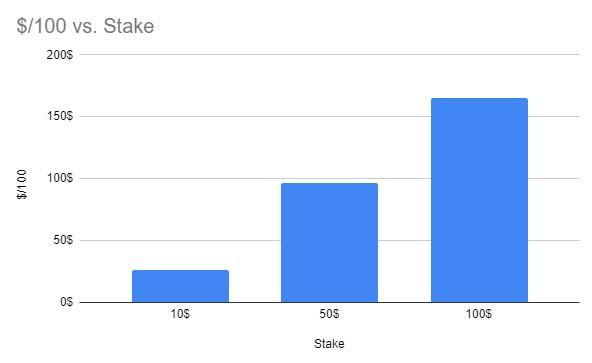
Considering that there is much less play at NL5k-10k, the average profit of a NL1k regular per year will be even higher. But, as I already said, high rollers play at different limits in several rooms, so this graph does not reflect an objective picture:
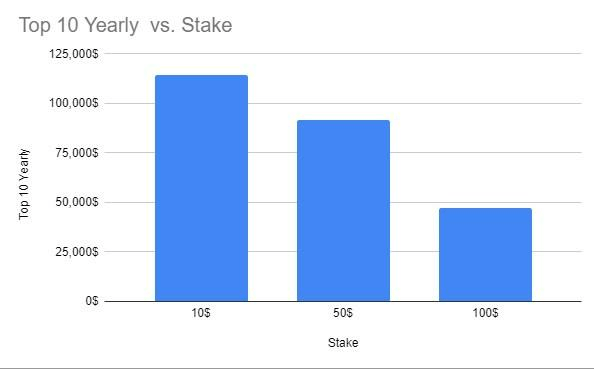
The main argument against going high stakes is the bankroll that is needed to minimize the risk of financial ruin. You will always have to keep a large sum on hand, although this money could be invested and receive additional income. This loss of potential profit must also be taken into account.
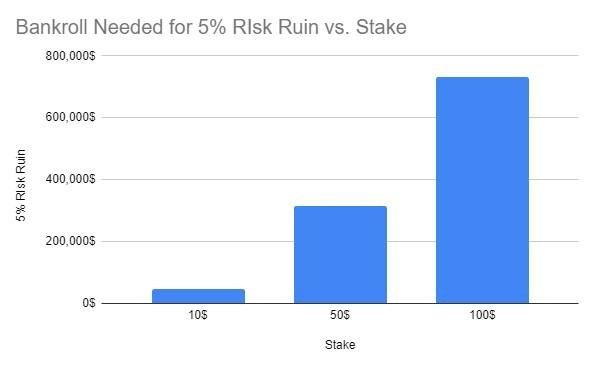
It's probably best to take small shots to spread out the risk over a longer period. In this case, even unsuccessful high-stakes entries will not have a significant impact on the results of the year. But this approach is difficult to accept psychologically.
For myself, I have decided to focus on $5/$10 and $10/$20 for now, at least until the end of this year. With two kids and my own business, I already have enough stress in my life without making crazy $100k streaks. I still love poker, I wake up every day wanting to grind, but I'll hold off on big goals for now until I feel ready again.
It is curious that the other day a discussion on almost the same topic flared up on the GipsyTeam forum in the new Majkdern diary.
Here are selected quotes:
Diary author: “In general, I am very disappointed in poker, my choice to develop in it, and I want to stop all this as quickly as possible. If there was a big upswing in high stakes, I would have left long ago. I have never hidden the fact that I came here for money.”
BootieInUFace: “By the time you start hitting some nl200-500, you get the feeling that the path to millions is open and you just need to work hard to achieve the goal. Few people, having passed this mark, do not dream of realizing themselves at the very top. However, it turns out that now is not 2016 and there is not enough volume of play to earn that same couple of million by grinding 1-2k, so you have to mix limits and stupidly hope for luck, since you can gain distance either with reg wars with 0.5bb wait + fierce display, or spend five years of your career during which the advantage will become even smaller, as will the volumes.
So it turns out that modern high-achievement poker is more of a lottery than a sporting competition, which is of course disappointing, especially considering that in return you give 10+ of your most productive years of life, engaging in activities that are destructive to the individual, without getting the hard skills that you can apply in another career and not having a reserve of money for the rest of my life.
In general, I personally expected more from poker than just the opportunity to provide a good standard of living in exchange for better years.
By and large, the poker dream is dead, and “earning a lot on your skill so that you can last a lifetime” in cash is not possible without a powerful upswing at the very top (in fact, this is what the whole career is built for).
All the people currently sitting at 50/100+ are stories of a gigantic upstreak lasting a couple of years when entering the high stakes, or people who made their endless rolls before 2018.”
dyrdom1 : “To put it very simply, playing high stakes is not enough/no fucking way/big rake to just switch to 5k+ and separate there with distance + skill, as was the case with all the limits below.”
Alexz1z : “If I liked poker and had a goal to earn a lot of money, then I would first of all look at the opportunities:
Learn Omaha for the best bum hunter at those limits where there is not enough play in Hold'em.
Sell shares at high stakes so that the difference between 2k and 5k is not x2.5, but for example x1.5-1.7 – this will be much more effective at a distance for climbing
Study games in apps and other crazy shit rooms where OFC should not be kept for more than 2-3 buy-ins.
Look towards live poker (Macau, for example), where there is a good game and high expectations.
And this is just the first thing that came to mind, for those who really need it, I will find all the ways and not limit myself to hold’em on the Euro rooms.”
A few months ago, Freenachos also opened a temporary thread on Reddit and spent a couple of days answering questions from readers.
I played 5 million hands at the micros before I got to the high stakes. I will answer any questions.
My name is Patrick, I'm a professional poker player, owner/head coach of NachosPoker, and creator of videos for RunItOnce.
Over the course of several years, I went from a minus NL10 reg to shots (not entirely justified) at NL10k. I describe my path in detail in a blog on the RIO website.
Here's my chart for last year:
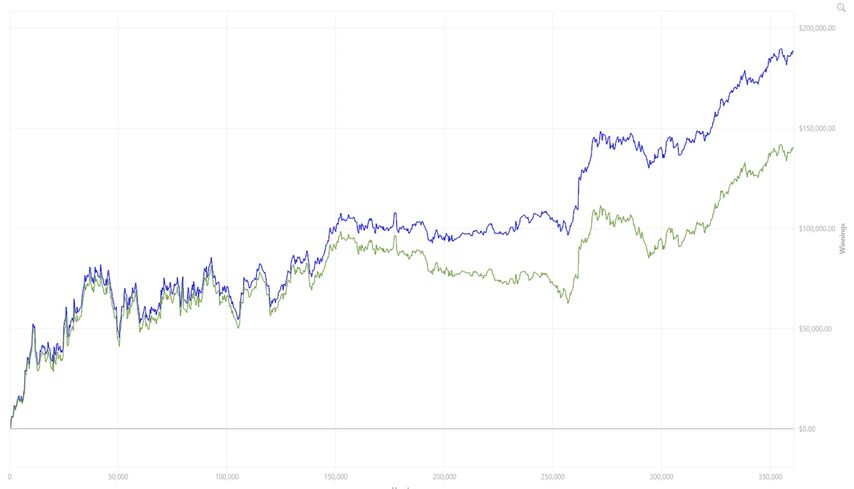
– What helped you get out of the micro-stakes?
– I will list a few main points.
Technical side: I stopped blindly copying the solver and switched to analyzing field trends and exploiting opponents’ mistakes. I started always bluffing in situations in which the field did not know how to defend itself, and simply folding when my opponents are obviously under-bluffing.
Training: In 2019, I submitted an application to Detox ( ed. – the Howard brothers’ training project ). There they helped me a lot in structuring the game.
Psychology: A huge problem for me at the micro-limits was the panicky fear of failure, I always doubted my actions and any reg seemed to me like a poker guru who plays a thousand times stronger.
Logistics: I decided not to do cashouts until I get to high stakes. I stuck to this rule until NL1k.
– Was there a specific moment when your game improved and you suddenly started winning? Or was it a gradual process?
– There were several such moments. One of them is when I first realized that you need to choose not the best bluffs, but the most suitable situations for bluffs. I remember once overbetting four pots on the river, and after much deliberation, I was shown the second nuts. It was like a light bulb went on: this works. Another was losing $10k on my first shot at NL1k. After that, I began to look at losses differently. For the first 20 minutes, I felt like complete crap, but then I realized that there are two ways to look at this situation.
1) I have never lost so much before, it will take a very long time to win it all back.
2) A couple of years ago I couldn’t even think that I could play at these limits and lose such amounts without feeling the urge to shoot myself afterward.
As a result, the girl who later became my wife and I went to the pub and got blackout drunk, celebrating my loss.
But most often this is a slow and gradual process – you analyze the hands in the solver, and experiment with the data. Most often this will end in nothing, but sometimes the result will be very useful.
– How do you assess the prospects of online poker? Will there come a time when no one will be able to play profitably? Aren't you afraid that you're spoiling your own expectations by training new regs?
– I’m sure online will live for a long time. Even with the development of technology, it will remain possible to win quite a lot (new games, some changes in current formats). There will always be amateurs, which means poker is here to stay.
I don't think my training has much impact on the average level of the field, there are too many people playing poker. If we take all the training funds, the effect, of course, will be much more noticeable. But this doesn't bother me too much. I try to constantly bring something new to my game and experiment to beat the field.
– What is the point of regwars at high limits? Isn't it more profitable to go lower, where there are many amateurs?
– My win rate hardly changes when moving to a new limit. The picture is similar for students. There are indeed fewer amateurs at high stakes, but the rake is also significantly lower. There are still a lot of amateurs at NL1k-2k, especially if you play with select.
– What is the best way to find flaws in your game? Name the three most common leaks that you should pay attention to first.
– 1. Defending the flop is the easiest thing anyone can learn. If you reach a good level here, the game on other streets will improve.
2. This is more complicated, but almost all players have a very strong betting range and a weak checking range. An easy way to fix this is to bet small with your entire range, but this doesn't always work. This is a significant leak, but it is not so easy to correct.
3. Players too often fold to a half-pot bet on the river, especially in small pots.
If I give general recommendations, I would advise starting with preflop, now it’s easy to find free ranges. Work with them, this will help you build a plan for the flop. Start with the simplest, gradually complicating the analysis. Five years ago I took notes on my own in Word, but now our students receive a 500-page book with detailed instructions for the game. The most important thing is to make a plan and build a strategy.
– Give examples of textures on which the field overdoes protection and on which it does not protect enough.
– Not enough:
– In most polarizing situations, people choose to check, especially against delayed continuation bets.
– Low textures
– 4-flush boards
Overdoing it:
– On the river, after calling a check-raise on the turn. Most often they defend well against three barrels; In general, there are not many lines against which one defends too much.
In general, it depends on the limits. At low limits, the field folds more often and bluffs less, compared to high stakes.
– It always seems to me that my opponents never bluff and call me on everything. How do I deal with this?
– Working with the databases helped me a lot. Let's say we get half a pot on the river. For a call to be profitable, your opponent must be bluffing 25% of the time. Most regulars in this situation try to guess their opponent's range, but we just can't say for sure whether he will be bluffing 28% or 22%. Even if your guess turns out to be correct, you will still lose the hand more often, and this leads to self-doubt.
Instead of this guessing game, I study the bluff frequencies of regs over a distance of 200 million hands. If the average reg is bluffing in this situation, I call. And although I will lose more often (this is an inevitable reality in games with pot odds), it is much easier to accept this when you understand that your decisions are based on some kind of calculation.
Working with large databases is also too difficult, so I’ll give you a few tips that will help you quickly correct obvious leaks:
1. Call half-pot bets on the river more often.
2. If you are going to bluff, but think about calling for more than 20 seconds, it is better to fold.
3. If you are in doubt about whether to bluff or not, close your eyes and bluff, this is usually the best decision.
A lot depends on the limits and rooms you play in, but these tips can be a good starting point.











